人教版高中英语必修五Unit 4《Making the news》word导学案1
- 格式:docx
- 大小:23.90 KB
- 文档页数:4
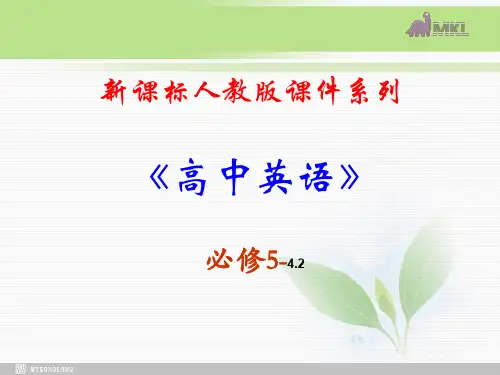
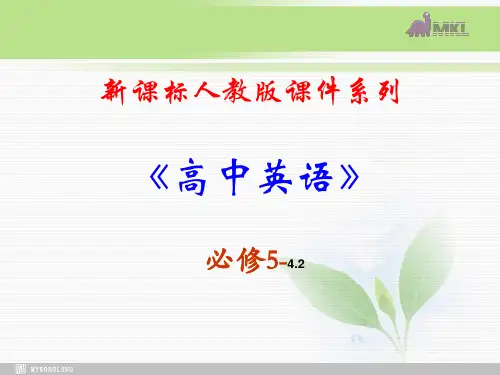
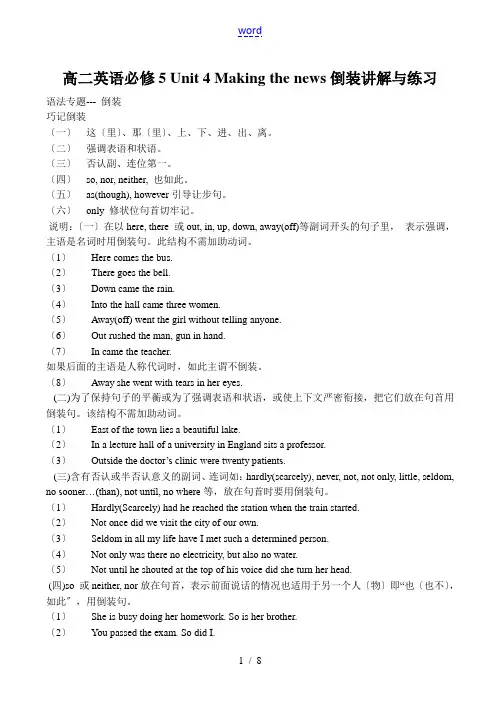
高二英语必修5 Unit 4 Making the news倒装讲解与练习语法专题--- 倒装巧记倒装〔一〕这〔里〕、那〔里〕、上、下、进、出、离。
〔二〕强调表语和状语。
〔三〕否认副、连位第一。
〔四〕so, nor, neither, 也如此。
〔五〕as(though), however引导让步句。
〔六〕only 修状位句首切牢记。
说明:〔一〕在以here, there 或out, in, up, down, away(off)等副词开头的句子里,表示强调,主语是名词时用倒装句。
此结构不需加助动词。
〔1〕Here comes the bus.〔2〕There goes the bell.〔3〕Down came the rain.〔4〕Into the hall came three women.〔5〕Away(off) went the girl without telling anyone.〔6〕Out rushed the man, gun in hand.〔7〕In came the teacher.如果后面的主语是人称代词时,如此主谓不倒装。
〔8〕Away she went with tears in her eyes.(二)为了保持句子的平蘅或为了强调表语和状语,或使上下文严密衔接,把它们放在句首用倒装句。
该结构不需加助动词。
〔1〕East of the town lies a beautiful lake.〔2〕In a lecture hall of a university in England sits a professor.〔3〕Outside the doctor’s clinic were twenty patients.(三)含有否认或半否认意义的副词、连词如:hardly(scarcely), never, not, not only, little, seldom, no sooner…(than), not until, no where等,放在句首时要用倒装句。
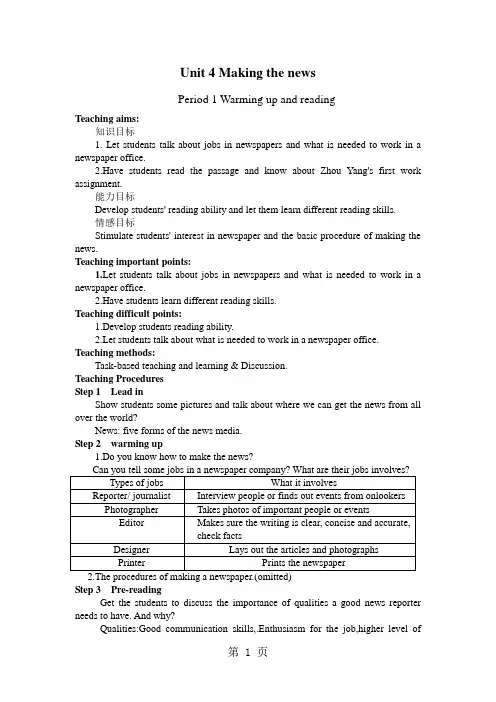
Unit 4 Making the newsPeriod 1 Warming up and readingTeaching aims:知识目标1. Let students talk about jobs in newspapers and what is needed to work in a newspaper office.2.Have students read the passage and know about Zhou Yang's first work assignment.能力目标Develop students' reading ability and let them learn different reading skills.情感目标Stimulate students' interest in newspaper and the basic procedure of making the news.Teaching important points:1.Let students talk about jobs in newspapers and what is needed to work in a newspaper office.2.Have students learn different reading skills.Teaching difficult points:1.Develop students reading ability.2.Let students talk about what is needed to work in a newspaper office. Teaching methods:Task-based teaching and learning & Discussion.Teaching ProceduresStep 1 Lead inShow students some pictures and talk about where we can get the news from all over the world?News: five forms of the news media.Step 2 warming up1.Do you know how to make the news?Can you tell some jobs in a newspaper company? What are their jobs involves?Types of jobs What it involvesReporter/ journalist Interview people or finds out events from onlookers Photographer Takes photos of important people or eventsEditor Makes sure the writing is clear, concise and accurate,check factsDesigner Lays out the articles and photographsPrinter Prints the newspaper2.The procedures of making a newspaper.(omitted)Step 3 Pre-readingGet the students to discuss the importance of qualities a good news reporter needs to have. And why?Qualities:Good communication skills,.Enthusiasm for the job,higher level ofeducation,hard working,Curious, active personality...enthusiasm = a strong feeling of interest and enjoyment about something and and eagerness to be involved in it.be full of enthusiasm about…热衷于……Step 4 Reading1.SkimmingWhat’s the main idea of this passage?This passage is about _______’s first _______ at the office of China Daily. And his ________ with his new _____, Hu Xin.Now please listen to the passage and underline the questions which Zhou Yang asks. Try tolook at the way the questions develop.⑴Can I go out on a story immediately?⑵What do I need to take with me?⑶What do I need to remember when I go out to cover a story?⑷What should I keep in mind?⑸Why is listening so important?⑹But how Can I listen carefully while taking notes?⑺Have you ever had a case where someone accused your journalists of getting the wrong end of the stick?2. ScanningTrue or False questions.(TFTFFF)1, Don’t go out on a story on your own at first.2, Take a notebook, a pen as well as a camera.3, Be curious and ask different questions to get all the information4, Talk too much during the interview.5, A reporter doesn’t need to listen to the detailed facts.6, We can always use small recorders to make sure that we get all our facts straight.3 . Careful readingPart 11.When could Zhou Yang cover a story by himself?Not till he is more experienced.2. Why is there no need for him to carry a camera?Because he will have a professional photographer with him to take photographs. Part 2:What does Zhou Yang need to remember when he goes out to cover a story?1.You need to be ______ and able to tell when people are ___________. In that case, you must use __________ or ___________ to find out the truth.2. Don’t be ____, don’t talk too much yourself and must _________________ carefully.3. While listening, you can use ______________ to make sure that you get all the facts ________. It also can provide ______ to support your story, if you are accused.Part 3: Are the following statements true or false?(FFFF)Hu Xin never had a case where somebody accused his reporters of getting the wrong end of the stick.The footballer was accused because he lost the game.The footballer admitted in the interview that he had taken some money from the man.The reporters found out the truth from the footballer’s words.Step 5 RevisionZhou Yang’s notes1.The skills needed2.The importance of listening3.Stages in researching a story4.How to check facts5.How to deal with accusations of liesStep 6 Homework1. Read the text by yourself and finish Ex 1 & 3. (P27-28)2. Read and find out the useful words and expressions in the reading text.。
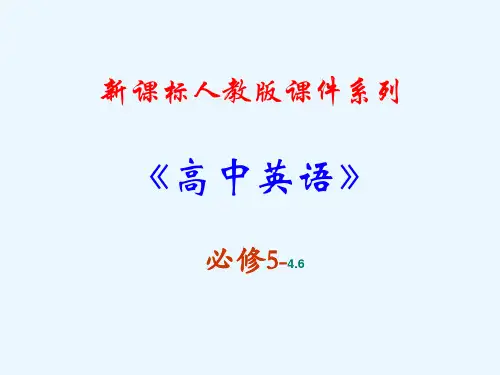
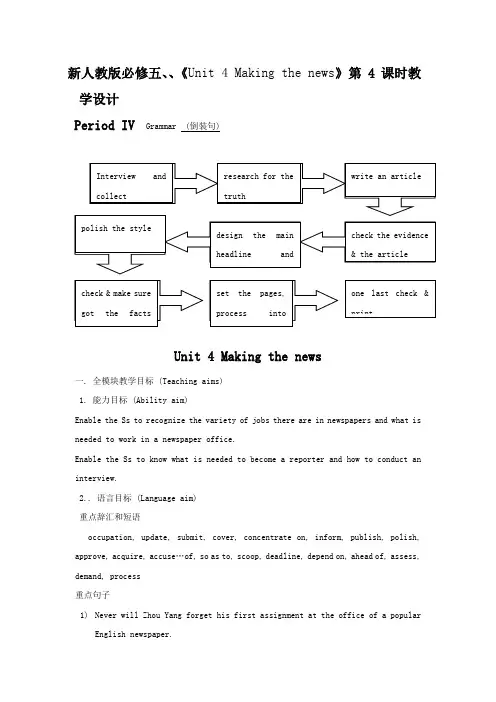
新人教版必修五、、《Unit 4 Making the news》第4课时教学设计Period IV Grammar (倒装句)Unit 4 Making the news一. 全模块教学目标 (Teaching aims)1. 能力目标 (Ability aim)Enable the Ss to recognize the variety of jobs there are in newspapers and what is needed to work in a newspaper office.Enable the Ss to know what is needed to become a reporter and how to conduct aninterview.2.. 语言目标 (Language aim)重点辞汇和短语occupation, update, submit, cover, concentrate on, inform, publish, polish, approve, acquire, accuse…of, so as to, scoop, deadline, depend on, ahead of, assess, demand, process重点句子1)Never will Zhou Yang forget his first assignment at the office of a popularEnglish newspaper.2)You’ll find yo ur colleagues very eager to assist you, so you may be able toconcentrate on photography later if you’re interested .3)Not only am I interested in photography, but I took an amateur course atuniversity to update my skills.4)Only if you ask many questions will you acquire all the information you needto know.5)We say a good journalist must have a good “nose” for a story.6)Meanwhile you have to prepare the next question depending on what the personsays.7)Have you ever had a case where somebody accused your reporters of getting thewrong end of the stick?8)Perhaps I too will get a scoop!Aids: Multimedia facilities, tape-recorder, photos, diagrams二. 教学重难点 (Teaching important points)Know what is needed to become a reporter and how to conduct an interviewMaster the use of inversion.三. 教学方式 (Teaching method)Fast reading; Task-based method & discussion四. 教学步骤 (Teaching procedure)Step1.概念:在英语中,主语和谓语的语序一般是主语在前,谓语在后。
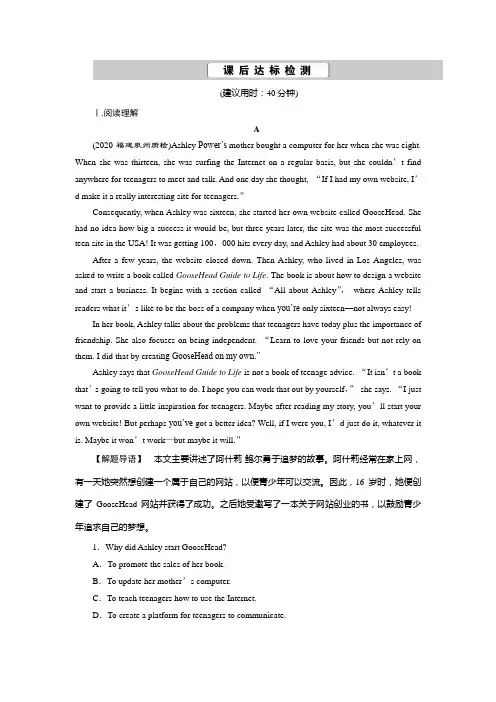
(建议用时:40分钟)Ⅰ.阅读理解A(2020·福建泉州质检)Ashley Power’s mother bought a computer for her when she was eight. When she was thirteen, she was surfing the Internet on a regular basis, but she couldn’t find anywhere for teenagers to meet and talk. And one day she thought, “If I had my own website, I’d make it a really interesting site for teenagers.”Consequently, when Ashley was sixteen, she started her own website called GooseHead. She had no idea how big a success it would be, but three years later, the site was the most successful teen site in the USA! It was getting 100,000 hits every day, and Ashley had about 30 employees.After a few years, the website closed down. Then Ashley, who lived in Los Angeles, was asked to write a book called GooseHead Guide to Life. The book is about how to design a website and start a business. It begins with a section called “All about Ashley”,where Ashley tells readers what it’s like to be the boss of a company when you’re only sixteen—not always easy!In her book, Ashley talks about the problems that teenagers have today plus the importance of friendship. She also focuses on being independent. “Learn to love your friends but not rely on them. I did that by creati ng GooseHead on my own.”Ashley says that GooseHead Guide to Life is not a book of teenage advice. “It isn’t a book that’s going to tell you what to do. I hope you can work that out by yourself,”she says. “I just want to provide a little inspiration for teenagers. Maybe after reading my story, you’ll start your own website! But perhaps you’ve got a better idea? Well, if I were you, I’d just do it, whatever it is. Maybe it won’t work—but maybe it will.”【解题导语】本文主要讲述了阿什莉·鲍尔勇于追梦的故事。
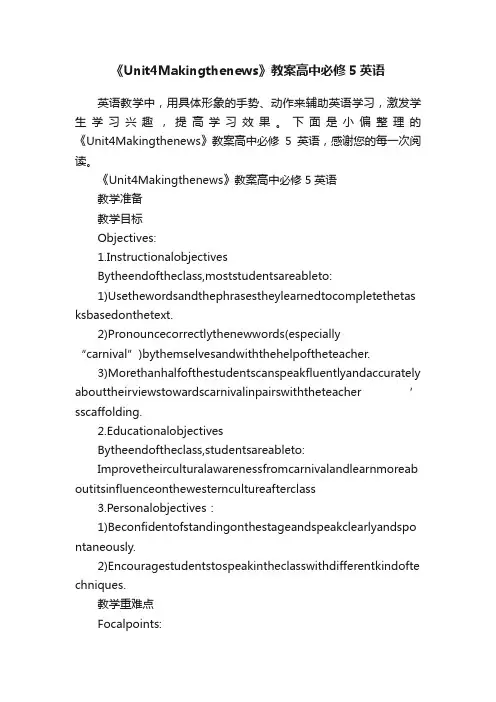
《Unit4Makingthenews》教案高中必修5英语英语教学中,用具体形象的手势、动作来辅助英语学习,激发学生学习兴趣,提高学习效果。
下面是小偏整理的《Unit4Makingthenews》教案高中必修5英语,感谢您的每一次阅读。
《Unit4Makingthenews》教案高中必修5英语教学准备教学目标Objectives:1.InstructionalobjectivesBytheendoftheclass,moststudentsareableto:1)Usethewordsandthephrasestheylearnedtocompletethetas ksbasedonthetext.2)Pronouncecorrectlythenewwords(especially “carnival”)bythemselvesandwiththehelpoftheteacher.3)Morethanhalfofthestudentscanspeakfluentlyandaccurately abouttheirviewstowardscarnivalinpairswiththeteacher’sscaffolding.cationalobjectivesBytheendoftheclass,studentsareableto:Improvetheirculturalawarenessfromcarnivalandlearnmoreab outitsinfluenceonthewesterncultureafterclass3.Personalobjectives:1)Beconfidentofstandingonthestageandspeakclearlyandspo ntaneously.2)Encouragestudentstospeakintheclasswithdifferentkindofte chniques.教学重难点Focalpoints:Bytheendoftheclass,studentsareableto:1)Improvethemainreadingskillsthroughcompletingreadingta sksinpairworkandgroupwork.2)Usethetabletofinishtheiressayabouttheirfavoritefilm.Difficultpoints:Bytheendoftheclass,studentsareableto:1)speakfluentlyandaccuratelyabouttheirfavoritefilmsinpairs withtheteacher’sscaffolding.2)Writeafilmreviewaccordingtothetableandthetext.教学过程ProceduresandtimeallotmentStage1GettingstudentsreadyforlearningT:Classbegins!Ss:…T:Goodafternoon,class!Ss:…T:Today,let’scometoCultureCorner.Module4.DoyouknowChinesefestivals?Ss:…T:First,Workingroups,discussandmakealistofChinesefestivalsi nEnglish.(1min).Ss:…T:OK,timeisup.YouknowChinesefestivals?Ss:…T:verygood.Forexample1.NewYear’sDay元旦节(1月1日)2.SpringFestival春节(农历正月初一)nternFestival元宵节(农历正月15)4.theQingmingFestival清明节(4月5日)5.DragonBoatFestival端午节(农历5月初五6.Double-ninthDay重阳节(农历9月初九)7.NationalDay国庆节(10月1日)T:Andfestivalsbroughtusmuchtraditionalknowledge.So,festiv alisbeautiful.Doyouknowforeignfestivals?Ss:...T:Inthetextbook,therearesomefestivalswithpictures.Doyoukn owtherightdescriptionsaboutthem?Ss:...T:ThisfestivalisattheendofOctober,when“ghosts”comeout.Ss:...T:ThisiswhenAmericansrememberthehardtimeswhentheyfirs tarrivedinthecountry.Ss:..T:Thisisafestivalofcolor,whichmarksthebeginningofspringinIn dia.Ss:...T:ThisisaChristianfestivalwhichcomesinthemiddleofwinterSs:...T:Let’swatchavideo.Canyouguesswhatfestivalitis?.T:Theyaredressedupinspecialclothes,andtheyarewearmasks.Ss:...T:now,Firstquestionishowdopeoplefeelonthisfestival?Second iswhatfestivalisit?Ss:...T:Yes,verygood.Now,let’swatchavideoaboutCarnival.Ss:...T:whatdoyourememberaboutcarnival?Ss:...T:Wherediditfirst?Ss:...Stage2Pre-readingStep1.Listentothetape.T:Let'slistentothefollowingpassagetolearnmoreaboutcarnival .Trytofindoutwhatplacesarementionedintermsofcarnivalcelebrati ons.Ss:..T:...Step2.Scanthepassageandtrytoanswerthequestions.T:Whatisthemeaningofcarnival?Ss:...T:Originallyitmeant“withnomeat”butnowitsymbolizes “life”.Step3.ReadthepassageandmatchcolumnAwithcolumnB.T:OK,nowIwillgiveyou1minutetoreaditagainandthenIwillasky ousomeStage3While-readingStep1Readthepassage.Choosethebestanswerstothetwosente nces.T:areyoufinish?Let’slookatthequestions.firstquestionisT odayCarnivalhasbecomeacelebrationof____. Whichoneyouchoose?A.freedomB.harvestC.lifeitselfD.successSs:...T:YES,verygood.NextquestionisWeneedto_____tounderstand whatcarnivalisallabout.A.lookatthehistoryofAmericaB.gotoAmericaC.lookatthemeetingoftwocultures---EuropeanandAfricanD.BothAandCSs:...T:....Step2checkwhetherthestatementsaretrueorfalse.T:…T:Now,let’scheck.Withtheopeningofhugefarmsandplantations,manyAfrica nswenttolookforjobsinAmerica.,what’syouridea?Ss:…T:Doyouagree?Ss:…T:Excellent,inparagraph2,thismarkedthebeginningoftheslave trade.Sothequestion1isFalse.T:nextquestion2,TheEuropeansimportedtheirfestivalsandlate rtheslaveslearnedfromthemandaddedtheirtraditions.Ss:...T:verygood.Thisanswerinparagraph3.Ss:...T:question3,Theslavetradewasabolishedandthesalvestookoverthecarnival.Ss:...T:thelast,Withthepassingoftime,carnivalbecameafestivalofth eblackpeopleonly.Ss:…T:Exactly!Superb!Step3SkimmingforspecificinformationTask:Answerthequestionsaccordingtothepassage.T:Readthetextcarefullyandanswerthequestions.Next,wewillreadthetextagaintoexplorehowthetextorganized. 3minutes,Let’sgo!T:Now,let’scheckyouranswers.Whatiscarnivaltoday?Ss:Carnivaltodayisaninternational,multiculturalexperience.T:ThesecondquestionisWhereweretheslavestakenfrom?Ss:InAfricaT:....T:Excellent!Stage5Post-readingDiscussion:UsefulquestionstomakeupdialoguesT:therehavesevenquestions,usefulquestionstomakeupdialog ues.Haveyoudressedupinspecialclothes?2Whatdidyouwear?3Howdidyoufeel?4Didyoueatspecialfood?5Didyougiveorreceivegifts?6Didyouhaveaholidayfromschool?7Didyouenjoyyourselfwithyourfamilyorfriends?T:Iwilldividetheclassinto3studentsinagroup.3minutes,1,2,beg in!Ss:...T:Timeisup.whichonedoyouchoose?Ss:....T:Yes,sothethemeofFrankensteinisaboutscienceandhumanity.T:OK,nextgroup,doyouhaveotheranswer?Ss:...课后习题homeworkDoexercisesonPage37-38.人教版高中英语必修5《Unit4Makingthenews》教案【二】Period1&2warmingupandreadingTeachingAims:1.Enablethestudentstotalkaboutthequalitiesneededtobeago odreporterandhowtoconductagoodinterview2.Enablethestudentstolearnsomereadingstrategies3.Enablethestudentstolearnthenecessaryqualitiesintheirfutur ejobImportantPointsanddifficultpointsLearnabouthowtobeagoodreporterTeachingmethodsStrategicreadingmethod;Task-basedmethodTeachingprocedures:I.Elaboration(warmingup):Helpthestudentstorelatetheirknow nknowledgetothetopicthatwillbelearnedTask1:(groupdiscussion)TalkaboutjobsinChinaDaily?TypesofjobsWhatitinvolvesreporterTask2:Predictwhatisgoingtobelearnedbylookingatthetitleoft hetext.Whichtypeofjobwillbetalkedaboutinthetext?II.Prediction(pre-reading):Task3:Predictthemainideaofthetextbydiscussingthefollowing questions:1.Whatarethequalitiesagoodnewsreporterneedstohave?(HavegroupdiscussionfirstandthenfinishPart1individually)2.Whatyourfirstdayatschoolwaslike?Howwouldyoufeelonyou rfirstdayatwork?(Groupdiscussion)III.Skimming,scanning,analyzing(Reading&Comprehending) Task4:Readthetextquicklytogetageneralideaofthetext.Task5:Dividethepassageintothreesectionsandmatchthefollo wingmainideastothethreesections:HowtogetanaccuratestoryHowtoprotectastoryfromaccusationsHowtobecomeareporterTheskillsneededTheimportanceoflisteningStagesinresearchingastoryHowtocheckfactsHowtodealwithaccusationsofprintingliesWorkinateamTask6Readquicklytofindouttheinformationtofillintheformbel owTask7:Tellwhatisrequiredforareporterandaphotographerpatient;imaginative;well-organized;technicallygood;polite;concise;thorough;creative;curio us;careful;gifted;professionalAreporterAphotographerIV.SummarizingTask8:WriteasummaryofthetextV.AssignmentReadanEnglishnewspaperandretellthemainideaofonearticlei nit.Period3&4Words&ExpressionsTeachingAims:Getthestudentstoknowhowtousesomewordsandexpressions correctlyandappropriatelyImportantPointsanddifficultpointsUsesomewordsandexpressionscorrectlyandappropriatelyTeachingmethodsDemonstratingandsummarizing;practicingTeachingprocedures:1.occupationn.1).Teachingismyoccupation.职业2).Swimmingismyoccupation.使…忙碌的事情;消遣occupyv.occupied=busyoccupyoneselfin/withsth.employment;occupation;job;profession;vocation;work;trade Heislookingaroundfor.:artistHeisoutof.Shechoseteachingasher.She’salawyerby.He’sacarpenterby.2.assignv.assignmentn. Shegladlyacceptedtheassignment.(分派的任务;工作) TheEnglishassignmentisabookreport.(课外作业,功课)3.onone’sownofone’sownforone’sownWeshouldcompletethetest_________4.experiencedadj.beexperiencedin/atsth/doingsth. Whoisexperiencedincookinginyourhome?5.Thefirst/lasttime+时间状语从句ThefirsttimeIcamehere,Iwasnotusedtotheclimatehere. Covern.封面,掩盖(物);v.1).Tomwillcoveredtheoutbreakofthedisease.2).Theroadwascoveredwithsnow.3).Shelaughedtocoverherworry.4).Theredarmycoveredabout30milesaday.5).Isthemoneyenoughtocoverthecostofanewshirt?7.Beeagerforsth.(sucess)todosth.thatclauseHeiseagertoseehisdaughter. Weareeagerthattheprojectshouldbestartedearly beanxiousabout=beworriedabout8.Concentrateonsth./doingsth. Weshouldconcentrateonourstudy. Tomisconcentratingonfishing.9.of+抽象名词(importance;value;use;help;benefit) ofspecialinterest=ofnouse=Themeetingisofgreatimportance.=Eachminuteis_____forus.ofgreatlyvaluablegreatvaluableofgreatvalueformuchvalue10.acquire;get;gain1).Isatinthefrontofthebusto____agoodviewofthecountryside.2).Graduallywe_______experienceinhowtodothework.3).They_____thevictoryafterabloodybattle.11.haveanosefor嗅觉灵敏Shehasanearformusic.有鉴赏能力Shehasaneyeforcolorandstyleinclothes.有眼光12.Meanwhile=inthemeanwhile=inthemeantime=atthesametimeMotherwentshopping;meanwhile,Icleanedthehouse13.traden.v.1).JapandoeslotsoftradewiththeUnitedStates.2).Heisashoemakerbytrade.3).Shetrades3applesforsomebananas.14.Trick1).窍门,手法2).playatrick(joke)onsb.=makefunofsb.(玩笑,恶作剧)3).Hegotintothebuildingbyatrick(诡计,花招)15.Challenge1).Hechallengemyviewonthatmatter.2).Tofinishthejobin2dayswasarealchallenge.16.Supportn.1).Ineedyoursupport.v.1)为…提供证据,证实2)Theoldmanenteredtheroomsupportedbyhisgrandson.3).Hehasalwayssupportedtheweakerparty.4).Hehasalargefamilytosupport.17.Case1).Hethoughthehadsolvedtheproblem,butthatwasnotthecase.2).Hereisacaseofbeingcareless.3).Wewilllookintothatcase.incaseofsth.如果,万一…inthat/thiscase在那样/这样情况下innocase决不incase+从句以防;可能;倘若Takeanumbrellaincaseitrains.(incase从句常用一般现在时表将来,或should+do)17.accusesb.ofsth.=chargesb.withsth.Tom____hisbossofhavingbrokenhisword.blamedaccusedchargedscolded18.soastodosth.只能在句末=inordertodosth.=sothat+从句=inorderthat+从句Igotupatfivesoastocatchthetrain=19.admitadmitdoing/havingdoneadmitsb.Into/to(theuniversity)Lilyfinallyadmitted___myumbrellabymistake.totaketohavetakenhavingtakenhavetaken20.n.adj.professionprofessional具有….特点FinishEx3onPage29AssignmentFinishEx1andEx2onPage28andEx3onPage29(Discoveringuse fulwordsandexpressions)FinishEx2,Ex3onPage63andEx4onPage64(Usingwordsandexp ressions)inWorkbook.Period5GrammarTeachingAims:Getthestudentstouse“Inversion”correctlyandappropriately ImportantPointsanddifficultpointsUse“Inversion”correctlyandappropriatelyTeachingmethodsTask-basedmethod;Demonstrating;discussion;summarizing;practicing Teachingprocedures:I.PresentationTask1:ComprehendthefollowingsentencesOnlythendidIbeginmyworkondesigninganewbridge.=Ibeganmyworkondesigninganewbridgeonlythen.2.NotonlywasthereaChristmastree,butalsoexcitingpresentsu nderit.=TherewasnotonlyaChristmastree,butalsoexcitingpresentsu nderit.Inversion:起强调作用II.Analyzing&summarizingTask2:Find4examplesofinversioninthereadingpassage1.NeverwillZhouYangforgethisfirstassignmentattheofficeofC hinaDaily.2.Onlywhenyouhaveseenwhatheorshedoes,canyoucoverasto rybyyourself.3.NotonlyamIinterestedinphotography,butItookacourseatun iversity.4.Onlyifyouaskmanydifferentquestionswillyouacquireallthei nformationyouneedtoknowTask3:Analyzethesentencesaboveandsummarizetherules1.Whycanthesesentencesuseinversion?2.Howaretheseinvertedsentencesmade?※否定副词no;not;hardly,little,seldom,never,nosooner…than,nomore,notonly,only等开头的句子要部分倒装。
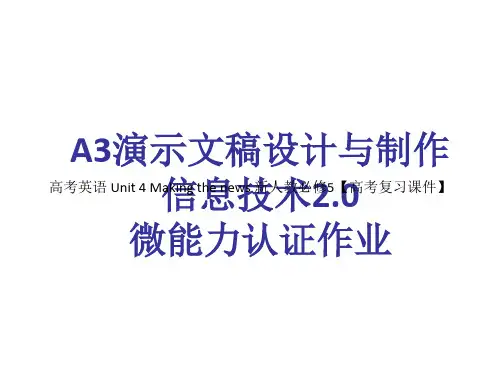
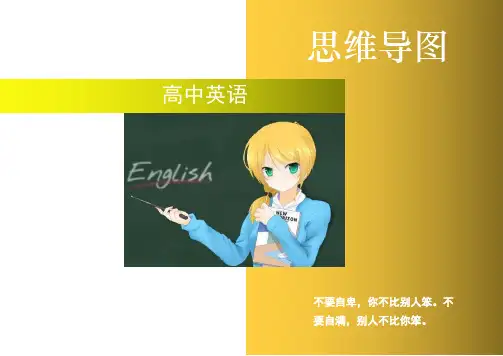
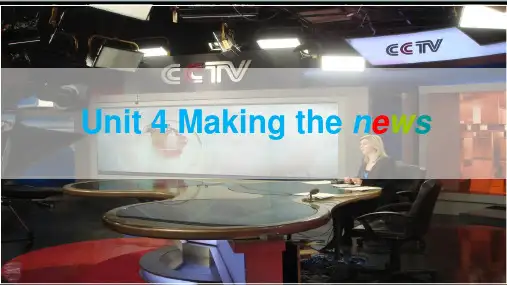
人教版高三英语一轮复习必修五Unit4Makingthenews单元教案(20页word版)2020届一轮复习人教版必修五Unit 4 Making the news单元教案Period 1Reading(MY FIRST WORK ASSIGNMENT “Unforgettable,”says new reporter )IntroductionIn this period, after the warming up, students will first be guided to go over expressions for news making. Then they shall be reading MY FIRST WORK ASSIGNMENT “Unforgettable,”says new reporter. They shall go through the following procedures while reading: reading aloud to the recording, reading and underlining, reading to underline the questions, reading and transforming information (open-ended question), reading and understanding difficult sentences, reading to decide on the type of writing and summary of the text and retelling the text in your own words. The period will be closed down by students taking a quiz.Objectives■To help students learn to make appointments■To help students learn to read a dialogue about being a news reporter■To help students better understand “making news”■To help students learn use some important words and expressions■To help students identify examples of “Inversion” in the textFocusAidsMultimedia facilities, tape-recorder, photos, diagramsProcedures1. Warming up⑴Warming up by discussingThink like a reporterHi, everyone. Today we will learn something about making the news. Suppose you work for China Daily, what types of jobs do you choose? What does it involve? Now in pairs discuss them. Give reasons for your choice.W ell done! By the way, have you ever heard “journalist”? Is there any difference between journalist and reporter? Ordinarily speaking, a reporter is a person whose job is to discover information about news events and describe them fora newspaper or magazine or for radio or television. And a journalist is a person who writes news stories or articles for a newspaper or magazine or broadcasts them on radio or television. Maybe in Chinese we can understand it better:Now let’s do with the pre-reading questions.⑵Warming up by taking about working for a newspaper⑶ Warming up by talking about the term "news" itself These days we've got so much topical news: American Election, Yasser Arafat's death... You know, there's an old saying in English--No news is good news. Does that mean if we do hear the news it's supposed to be bad? Everybody has his or her own opinion.However, I don't want to comment on any news here. I'd like to talk about the term "news" itself. So far how many expressions have you known about the news? You might mention "breaking news", "Daily news" ... Not enough! :) Come on.2. Pre-reading by going over expressions for news makingbreaking news 突发的消息wonderful news 极好的消息welcome news 可喜的消息topical news 时事新闻thrilling news 令人兴奋的消息television news 电视新闻tearful news 悲痛的消息surprising news 惊人的消息spread news 传播消息sore news 使人痛心的消息news agency 通讯社news analyst 评论员news bulletin 公告news communication 新闻广播news conference 记者招待会news editing 新闻编辑news film 新闻片news flash 最后新闻简短的新闻报道news hen (美)女新闻记者news network 新闻网news report 新闻报道news stall (newsstand) 报亭news window 新闻图片栏newsboy 报童,送报人newscaster 新闻播报员news letter时事通讯newspaper 报纸newspaper campaign新闻战newsreader 新闻广播员newsreel新闻影片newswire 新闻专线newsworthy 有新闻价值的3. Reading⑴ Reading aloud to the recordingNow please listen and read aloud to the recording of the text MY FIRST WORK ASSIGNMENT “Unforgettable,” says news reporter. Pay attention to the pronunciation of each word and the pauses within each sentence. I will play the tape twice and youshall read aloud twice, too.⑵ Reading and underliningNext you are to read and underline all the useful expressions or collocations in the passage. Copy them to your notebook after class and write a short passage, making use of them as homework.⑶ Reading to underline the quest ionsSkim the text and underline the questions that Zhou Yang asks. Notice the way the questions develop.Can I go out on a story immediately?What do I need to take with me?What do I need to remember when I go out to cover a story? What mistakes must I avoid?Why is listening so important?How can I listen to answers if I have to write down what he or she is saying?Have you ever had a case where somebody accused your reporters of getting the wrong end of the stick?⑷ Reading and transforming information (open-ended question) Discussion:Do you think Zhou Yang’s discussion with Hu Xin will strongly influence his life as a reporter? In what way?⑸Reading and understanding difficult sentencesAs you have read the text times, you can surely tell whichsentences are difficult to understand. Now put your questions concerning the difficult points to me.⑹ Reading to decide on the type of writing and summary of the textThis is a conversation between Zhou Yang and his boss HuXin. HuXin gives Zhou Yang some advice on what to do at the beginning as a reporter, on when to cover a story, on what mistakes he must avoid, on the importance of listening and so on. This conversation leads Zhou Yang to know about the qualities a journalists should have, the basic procedure and the thing they should pay attention to.4. Retelling the text in your own wordsA retold passage of the textThis story happens on the first day when Zhou Yang goes to work for China Daily. Zhou Yang asks his boss some questions such as when to cover a story, what mistakes he must avoid, why it is important to listen, how he can write down the answers and so on. Hu Xin influenced his life as a reporter.5. Closing down by taking a quizPeriod 3Learning aboutlanguage(Inversion)IntroductionIn this period students will be warmed up by discovering useful words and expressions first. They then will be learning about grammar, doing Ex. 1, 2, 3 and 4 on page 30. They go on to study some ready usedmaterials about inversion. The class is to be closed down by students doing a quiz.Objectives■To help students learn about Inversion■To help students discover and learn to use some useful words and expressions■To help students discover and learn to use some useful structures Procedures1. Warming up by discovering useful words and expressionsTurn to page 28 and do Ex. 1, 2 and 3 first. Check your answers against your classmates’.Keys for Ex. 1:Expressions Idiomatic meaningcover a story to report on an important eventtrick of the trade clever ways known to expertsget the facts straights to present ideas fairlyget the wrong end of the stick not to understand an idea properlythis is how the story goes this is the storyget a scoopto get the story firstKeys for Ex. 21.deliberately2.guilty3.concentrate…on4. professional5.eager6.tho rough7.accuse…of8.acquireKeys for EX.3Noun Adjective Meaningprofession professional to act like a person trained for a particular job education educational connect with the teaching of studentsform formal an official part of an activitytradition traditional following ideas and methods used for along time person personal something to do with oneself occupation occupational related to one’s job2. Learning about grammar倒装句(Inversion)Turn to pages 90 to 91 to find out wh at “inversion “ is like, and then find the same structure from the text.More for reference英语的基本语序是“主语+谓语”。
Unit 4 Making the news“Unforgettable”,says new journalistI.Teaching important points1.Let students talk about jobs in newspapers and what is needed to work in a newspaper office.2.Get students to read the passage and understand it.3.Have students learn different reading skills.II. Teaching difficult points1.Develop students’reading ability.2.Enable students to talk about what is needed to work in a newspaper office.III. Teaching aims and demandsLanguage aims:1.Get students to learn the useful new words and expressions in this part.2.Have students read the passage and know about zhouyang’first work assignment.Ability aims:1.Develop students’reading ability and let them learn different reading skills.2.Enable students to talk about jobs in newspapers and what is needed to work in a newspaper office.Emotional aims:1.Stimulate students’ interest in newspapers and the basic procedure of making the news.2.Develop students’sense of cooperative learning.Teaching aims:1.Enable the students to recognize the variety of jobs there are in newspapers and what is needed to work in a newspaper office.2.Enable the students to know what is needed to become a reporter and how to conduct an interviewee.3.Train the students’reading ability(skimming,detailed reading).Teaching procedure:Step 1.Lead-inThere are many kinds of occupations in the world, so which one do you want to choose? Step 2. Fast readingRead the text in 1 minute, and find out all the questions Zhou Yang asked.Step3.SkimmingRead and answer1.Where did the conversation happen?________________________________________________________________________ 2.Who were talking?________________________________________________________________________3.What does the reading passage mainly talk about? (a multiple choice)A.The skills necessary to become a good reporterB.The skills necessary to become a good photographerC.How to conduct a good interviewD.Being carefully in the new environmentE.A and CStep4.Careful readingWe can divide the passage into three parts according to the duties of a journalist.Part1.___________________________________________________________________ Part2.___________________________________________________________________ Part3.___________________________________________________________________ Part 1:(From the beginning to“Good”)1.When can a new journalist cover a story by himself?___________A. Never can a new journalist cover a story by himself.B. Only after he has seen what an experienced journalist does.C. Not until he is old enough .D. Only when he takes a camera with him.2.Zhou Yang took a course of photography at mid-school.(T/F)3.What a new journalist should do on the first day?(1). First he will be put as an assistant to an____________________________________(2).____________________________ him to take a________ with him. He will have a professional ____________ with him to take photographs.Part2.(From“What do I”to“support your story”)(1)While interviewing, the journalist would just ask the questions prepared in advance(预先).(T/F)(2)What a journalist needs to remember when going out to cover a story?a.He needs to be _________.b.A good journalist must have a good“_____”for a story.c.He has to listen for the _____________.d. If necessary, he can prepare a________ to make sure that he gets all the facts straight. Part 3 :(From “I see!”to the end)(1). The footballer admitted he took the money(T/F)(2).Zhou Yang is very eager to cover a story .(T/F)(3)The footballer was thought to be guilty because_______ .A. He usually told lies.B. He stopped the reporter publishing an article.C. He took money for deliberately not scoring goals so as to let the other team win.D. He bribed another football team.prehending(1)Zhou Yang’s notesSkills——◆We need to be _______ .◆To____all the information we need to know, we have to ask many different______ .◆To be a good reporter, we must have a “____ ”for a story.◆When we find people are not _______ , we must find out the missing parts of the ______ .Tips——Dos:◆______ to the answers carefully.Don’ts:◆Don’t be _____.◆Don’t talk too much ourselves.(2)Choose the correct explanation to the phrasesa.1 what do I need to remember when I go out to cover a story.( )A. tell a storyB. write storyC. send a storyD. report a storyb. A good journalist must have a good “nose”for a story.( )A. know what has happened.B.be able to “smell”the truth when somebody is telling part of it.C. be able to discover the whole truth by doing research.D. B and Cc. This is a trick of the trade.( )A. something that cheats somebodyB. something that helps you do the job in a professional way.C. something used to hide secrets.d.We sometimes use small recorders to make sure that we get all your facts straight.( )A. to make sure that the story is accurateB. to get the facts directlyC. to get the things speciallyStep 6.Post-reading——SummaryTo the journalists, there is no ______ for them to take a camera because they have professional ___________ with them. The journalists should be ________ and they must have a good _____ for a story. They know how to _______the information they need. While interviewing, they won’t be _____, they won’t_____ too much, and they ____ ___ the interviewee carefully. They will listen to the _______ facts and ask new questions. There is a trick of the _____, that is, with the permission of the interviewee, they would use a ________ which could keep the evidence to help __________their story.Step 7.Discussion(1)What is news?(2)Practice –interviewingStep 8.HomeworkFinish the exercise in«世纪金榜»P45 1,2,3.。